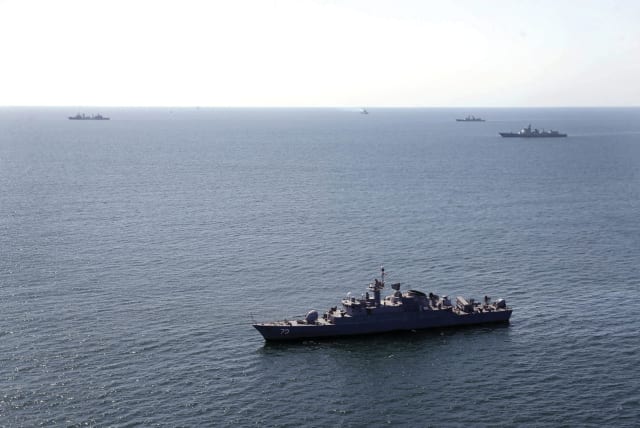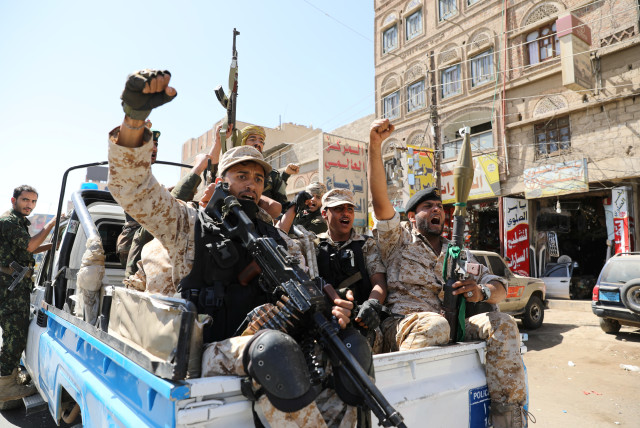The Biden administration must stop Iran - opinion

If Iran needs a perpetual enemy—the US and Israel—to rally the public to stay in power, they will have to be prepared to face the consequences.
Since the Iranian revolution in 1979, the US has not developed a long-term strategy toward Iran but instead has made tactical moves to deal with the various conflicting issues with Tehran as they arose. Conversely, from the time the clergy assumed power, Iran has developed a long-term strategy limited not only to staying in power but also to becoming the region’s hegemon without inviting major military retaliation by either the US or Israel on Iranian soil. It is time for the US to develop an effective long-term strategy to stop Iran in its tracks by taking specific measures that do not purposely seek regime change but may well precipitate such a change.
The US strategy should be based on the creation of a crescent of allied states stretching from the Gulf to the Mediterranean, where the US would expand its military-to-military, economic, and political cooperation with Middle Eastern countries, including the six Arab Gulf countries, Jordan, Israel, and Egypt. The missing link is the “State of Palestine,” which I will address below.
The realization of the US geostrategic objective will a) freeze Iran’s regional ambitions and its influence over the Arab states and b) prevent Iran from expanding its military cooperation with Russia and commercial ties with China, thus limiting their influence and imprint in the region to counterbalance the US’ near-dominance. To that end, the US must take several geostrategic measures as the building blocks that would lead to the establishment of the allied crescent.
• First, the Biden administration must address Iran’s objective to oust the US military presence in the Middle East, which would allow it to have a freer hand in challenging and intimidating US allies in the region and enable it to increase its influence and prestige. The Biden administration ought to disabuse Tehran of the notion that the US’ so-called pivot to the East is not and will not happen at the expense of reducing the American military presence in the Middle East, by continuously expanding security collaboration with its allies throughout the region. US President Joe Biden’s decision to dispatch two aircraft carriers to the eastern Mediterranean at the start of the Israel-Hamas war was a wise strategic move that sent a clear message to Iran, Russia, and China that the US is determined to keep the Middle East under direct American sphere of influence both politically and militarily.
• SECOND, Iran finances and provides military hardware and training to its ‘axis of resistance,’ including Hezbollah in Lebanon, the Houthis in Yemen, and Kataib Hezbollah in Iraq, to attack US military installations. Indirect talks between the US and Iran in Oman on January 10, focusing on the increasing threats posed by the Houthis to Red Sea shipping routes and the attacks on US military bases in Iraq and Syria by militia supported by Iran, failed to reach an agreement. While Iran proclaimed to have no control over the Houthis, its representative at the talks stated that his country could use its influence to ensure that all attacks would stop, provided that the US arranged for a ceasefire in Gaza. Being the main supplier of military hardware to the Houthis, including missiles and drones, it is clear that Iran can – if it chooses – stop the Houthis from attacking ships in the Red Sea and must do so unconditionally; otherwise, it will be held responsible and bear severe consequences for its refusal to stop the Houthi attacks.
Iran uses these groups to do its dirty work. American retaliation against these groups is a price Tehran is “happy” to pay as long as it doesn’t suffer casualties of its own and prevents a direct American attack, especially on its nuclear facilities and other major military industry complexes. The Biden administration must warn Tehran that given its undisputed military and economic support of its militia, the US will view future attacks on any American military or civilian assets as an assault by Iran and that the US will not hesitate to directly attack Iran’s much-prized assets.
Iran does not want war with US
• Third, Iran does not want to start a war with the US, knowing full well that the US, with its far superior military power, could inflict a devastating blow that could bring down the regime. In this regard, the Biden administration should not state time and again that the US does not want to wage war against Iran. Even though the US has no plan to attack Iran and presumably wants to mitigate Tehran’s concerns about regime change, reiterating this repeatedly makes the clergy feel more secure in their power, and thus, they will continue to destabilize the region through their proxies, “the axis of resistance,” and their direct interference in the internal affairs of several Middle Eastern countries, including Iraq, Syria, and Yemen, and do so with near-impunity.
• Fourth, Iran views Israel as the obstacle in its quest for regional hegemony. Knowing, however, that Israel is more powerful militarily and enjoys US security guarantees, Iran seeks to neutralize Israel’s nuclear capability by reaching its own nuclear threshold. In this regard, the Biden administration should warn Iran that while the US is still open to negotiating a new nuclear deal, which would lead to a more amenable and constructive relationship, Washington will not stay idle should Iran produce an operational nuclear weapon. This would also alleviate the concerns of those Israelis who are genuinely worried about Iran’s nuclear program.
• FIFTH, in spite of the fact that Hamas, Iran’s second most important proxy after Hezbollah, stands to potentially be crushed by Israeli forces, Tehran does not want Hezbollah to engage Israel militarily on a large-scale but only show some solidarity with Hamas by firing short-range rockets on Israeli targets on a limited basis. Iran wants to prevent Israel from invading Lebanon and inflicting massive losses on Hezbollah because it wants to reserve Hezbollah’s military capability for a different contingency, especially if Iran is directly hit by the US and or Israel. The US should make it clear to Iran that the continuing supplies of weapons to Hezbollah, including drones, is viewed as threatening and provocative and will result in imposing additional crippling sanctions.
• Sixth, Iran does not want other Arab states, especially Saudi Arabia, to normalize relations with Israel, as this will open the gates of normalization of relations with most of the Arab states, as well as many Muslim countries. The US should carefully consider Saudi Arabia’s four requirements in exchange for the normalization of relations with Israel: the establishment of a Palestinian state, guaranteeing the Saudis’ national security, providing Riyadh with a nuclear development program for peaceful purposes, and allowing the Saudis to purchase advanced American military equipment. Reaching an agreement with Saudi Arabia based on its requirements will be the forerunner for the establishment of the allied crescent from the Gulf to the Mediterranean.
• Seventh, Biden must begin the process of establishing an independent Palestinian state, which he has continuously asserted in recent months. Hamas’s October 7th attack on Israel, which led to the ongoing Israel-Hamas war, reaffirmed that the occupation is not sustainable and that Israel must come to terms with the establishment of a Palestinian state, which is the missing link for the creation of the allied crescent. Beyond that, the establishment of a Palestinian state will pull the rug from underneath Iran, which has been exploiting the Israeli-Palestinian conflict as the rationale behind its vehement refutation of Israel’s right to exist.
To that end, the Biden administration should develop a long-term strategy designed to limit Iran’s regional influence by pursuing a new regional paradigm based on what I generally outlined above. The US, which already has a massive military presence in the Middle East, must now move to expand that into a regional security alliance. Based on my research and contacts in the region, every country mentioned above welcomes such an alliance, as they see it as the cornerstone of regional stability. The US should make it clear that the new alliance is not meant to threaten Iran, and in fact, the allied states would cooperate with Tehran on regional security and develop extensive commercial ties if it chose to become a constructive player.
To be sure, the Iranian clergy must understand that “business is not as usual.” But if they need a perpetual enemy—the US and Israel—to rally the public to stay in power, they will have to be prepared to face the consequences.
The writer is a retired professor of international relations, most recently at the Center for Global Affairs at NYU. He teaches courses on international negotiation and Middle Eastern studies.
Jerusalem Post Store
`; document.getElementById("linkPremium").innerHTML = cont; var divWithLink = document.getElementById("premium-link"); if (divWithLink !== null && divWithLink !== 'undefined') { divWithLink.style.border = "solid 1px #cb0f3e"; divWithLink.style.textAlign = "center"; divWithLink.style.marginBottom = "15px"; divWithLink.style.marginTop = "15px"; divWithLink.style.width = "100%"; divWithLink.style.backgroundColor = "#122952"; divWithLink.style.color = "#ffffff"; divWithLink.style.lineHeight = "1.5"; } } (function (v, i) { });

